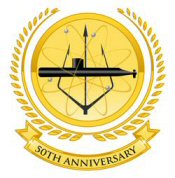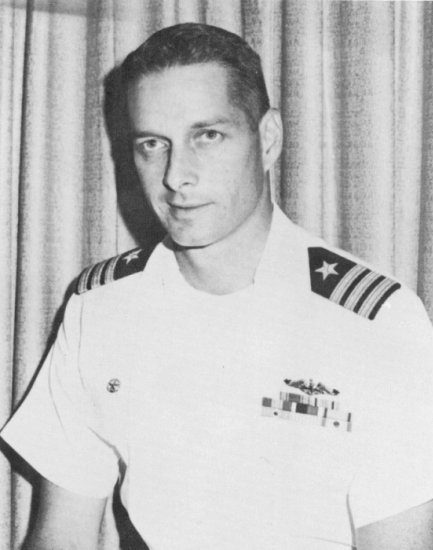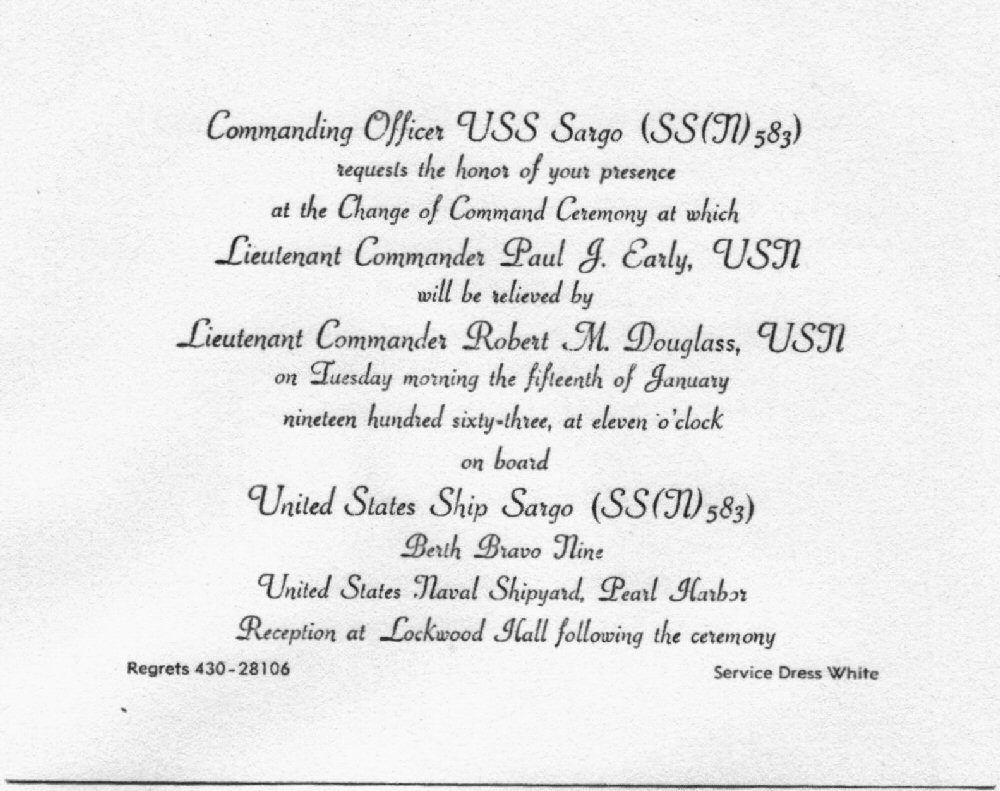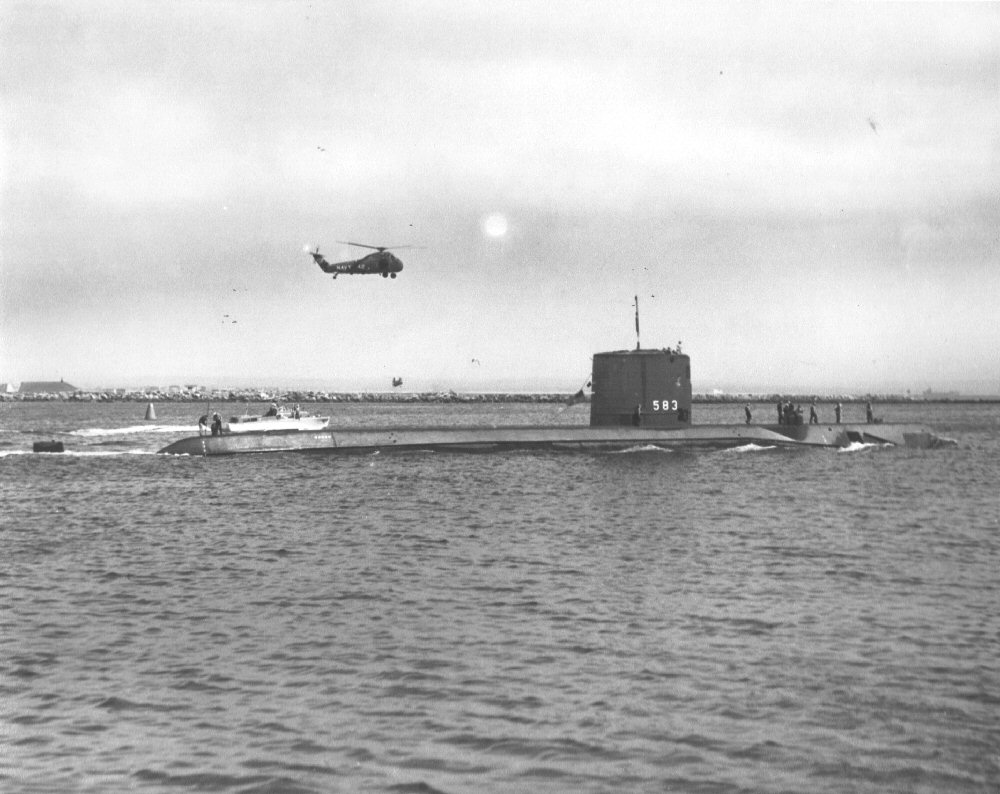
1963

|
USS SARGO (SSN 583)
1963 |

Click on the pictures to enlarge!
CHANGE OF COMMAND

|
On 15 Jan 1963, LCDR Robert M. Douglass relieved CDR Paul J. Early as Commanding Officer. |

|
| CDR Robert M. Douglass |

|
| Invitation to the Change of Command |

| The USS SARGO continued its overhaul through January and February. An interesting newspaper article was published just prior to the completion of the overhaul: |
|
By LYLE NELSON
Pearl Harbor shipyard workers are finishing up the most painstaking overhaul job in
the 55-year historyof the yard and the nuclear submarine Sargo should be back with the
fleet before the end of the month.
High point of the Sargo overhaul has been the replacement of the old nuclear reactor
with a new one. The reactor is the power plant that keeps the sub running for months
without refueling.
The work apparently has gone smoothly but one costly delay was underscored in the latest
issue of the Shipyard Log, a newspaper for shipyard workers.
Editor Doris Obata wrote "What appeared to be an insignificant crimp on a small piece of
copper pip casued a two-day delay in reactor plant work on the Sargo and upped the repair
costs by more than $5,000.
"The delay and added costs are bad enough, but what is more important is the posibility
that someone at Pearl Harbor Naval Shipyard doesn't have the courage to accept the
moral responsibilities of his job."
A Navy spokesman said the story needed clearance first from Washington, probably from
Vice-Admiral Hyman G. Rickover, father of the nuclear sub.
CLASSIFIED MATTER Practically all information about overhaul work on nuclear
subs is classified and not made public.
But for a year now the Shipyard Log has carried numerous articles pointing out the size
and importance of the Sargo overhaul undertaking on the one hand and the need for
integrity among shipyard employees on the other.
The Log has said the Sargo work amounts to about three times the scope of a normal ship
overhaul.
Specialists have been needed and safety precautions have been exacting.
The Sargo job probably has fired the imagination of the shipyard like nothing since the
crash speed task of putting "battleship row" casualties back in actions following December
7, 1941.
Regarding the small dent in the copper pipe, the Log said "To report an honest mistake
or accident is often difficult, but not to do so could mean more than the loss of money
and time - it could mean the loss of lives.
"... the person causing the sharp crimp probably had some knowledge of it. Whether he
realized it or not, he was sabotaging the Sargo," the Log said.
The defect was detected and fixed in a time-consuming checkout process.
The Log added "If it had not been discovered, the crimp would have impeded the flow of
cooling water to a vital component causing it to overheat and malfunction."
In contrast, the Log pointed out that a Shop 41 mechanic admitted to a supervisor in
October that he had inadvertently dropped two tools into a component. The tools were
recovered without delay in the work schedule, the Log said.
The Sargo overhaul started July 30. Other nuclear subs are expected later. Pearl Harbor
is one of four places where the job can be done.
The most important phase of the job - refueling - was completed in October. This
involves lifting out the old nuclear core and lowering in a new one.
At the time the Log reported the work schedule was running slightly behind schedule.
Some of the work load in late October was on a round-the-clock basis, again
reminiscent of the days following the Pearl Harbor Attack.
The yard newspaper likened the overhaul of the nuclear reactor to the work of a
surgeon.
An opening was made directly over the reactor and as each spent fuel element was
removed a new one replaced it, the newspaper said.
Miles of pipe had to be removed for cleaning and seperate overhaul jobs in Pearl
Harbor's many shops.
Special clothing and tools were needed.
Radiation dangers meant careful planning, and detection procedures were necessary.
Before the Sargo arrived at the yard a Nuclear Inspectors Training Program was set
up for shipyard employees. Twenty-three people graduated from the school after some
80 hours of instruction and seven later were promoted.
James Fleming of the Nuclear Plant Quality Control Branch was quoted in the Log as
saying the yard would need in the future more men with nuclear overhaul training
and experience.
The Sargo job is the first for Pearl Harbor.
Fleming said if enough yard workers could be trained in nuclear procedures
specialists wouldn't be needed from Mainland yards.
To do the Sargo job an expansion of nuclear facilities at the yard included a
nuclear chemistry lab and a mobile lab for water testing and dockside testing.
The floating YR-74 was brought in as a radiological control work center.
Pearl Harbor employees working on the Sargo needed physical examinations first
and the Shipyard Log often stressed the need for workers to report any mistakes.
The Sargo job was an important factor in keeping the yards 5,000-man work force
steadily productive.
The Shipyard Log often emphasized the pride yard workers should feel in being
able to do such a complicated job.
The them "Go, Go, Sargo" was advertized in road signs on the base in the tradition
of a college football cheering section.
A former assistant to Rickover, Captain Arthur Francis, was a key man in
supervising the overhaul.
Mare Island, California, where nuclear subs are built and Pearl Harbor are the
only Pacific yards that can accomplish nuclear refueling but Bremerton, Washington,
may soon join the list. The work will increase in volume and importance as Polaris
subs are shifted to the Pacific with many home-ported at Pearl Harbor.
|
|
The USS SARGO successfully completed the first-ever refueling overhaul and
was returned to service in March, 1963.
During March and April the USS SARGO conducted local operations and upkeep in the Pearl Harbor area in preparation for operations in the Eastern Pacific.
|
| The USS SARGO departed in April to conduct post overhaul training and a shakedown cruise to the Eastern Pacific, returning to Pearl Harbor in June. |

|
| The USS SARGO outbound to sea departing San Diego. |
|
From June to July the USS SARGO was in port at Pearl Harbor making
preparations for an extended cruise to the Western Pacific.
USS SARGO conducted an extended cruise to the Western Pacific from July to October, 1963. After returning to Pearl Harbor, the USS SARGO remained in port for holiday leave and an upkeep period. |
